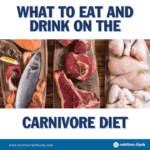

What Should I Eat From the Red Meat List?


As individuals begin their carnivore diet journeys, understanding what to incorporate from the red meat list becomes pivotal. Red meat, often at the heart of this nutritional approach, offers a plethora of health benefits that are instrumental in supporting wellness and vitality.
This diet, centered around nutrient-dense choices, emphasizes the importance of selecting the right types of red meat to maximize nutritional intake. Our guide to the red meat list will navigate you through the myriad of options available, ensuring you harness the full potential of red meat’s health-enhancing properties.
Whether you’re seeking to improve body composition, enhance energy levels, or support overall health, our insights will empower you to make informed dietary choices that align with your wellness goals. Let’s take a closer look at what you should eat from the red meat list.
What Is the Carnivore Diet?
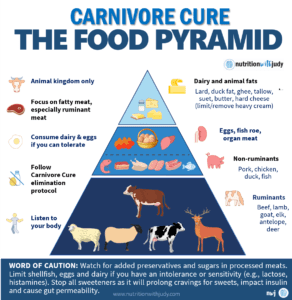

The carnivore diet, frequently termed “Carnivore” or identified as a strictly carnivorous eating regimen, is characterized by exclusively consuming animal-derived products and deliberately avoiding all forms of plant-based foods and grains. This dietary approach sets itself apart from other low-carbohydrate diets, such as the ketogenic diet, by adopting a strict zero-carbohydrate or near-zero-carbohydrate stance, with a heavy emphasis on sourcing nutrients primarily from animal proteins and fats.
There are multiple variations of the carnivore diet, each defined by specific guidelines that dictate the inclusion or exclusion of certain types of foods. These variations cater to different dietary preferences and nutritional needs, offering flexibility within the diet’s framework.
Understanding the nuances of these variations is crucial for individuals looking to embark on the carnivore diet, as it enables them to make an informed choice about which version of the diet is most conducive to achieving their personal health goals and maintaining long-term sustainability. This knowledge is pivotal for tailoring the diet to individual preferences, ensuring a harmonious balance between dietary discipline and personal well-being.
What Are the Benefits of the Carnivore Diet?
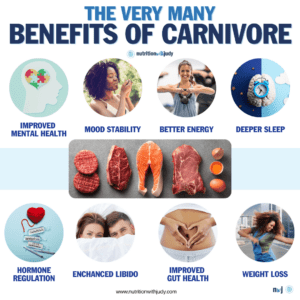

The carnivore diet offers a range of benefits that can cater to various health and wellness goals. This dietary approach is gaining traction among those looking for a simplified yet effective way to improve their health. Here is a summary of some of the benefits associated with the carnivore diet, explaining why individuals might consider this nutritional path.
1. Simplified Dieting Approach: The carnivore diet simplifies eating habits by eliminating the need to track macros or calories closely. Since the diet generally consists of meat, fish, eggs, and certain dairy products, it reduces the complexity of meal planning and preparation, making it an attractive option for those seeking a straightforward dietary regimen.
2. Potential Weight Loss: Many individuals turn to the carnivore diet for weight loss. By focusing on high-protein and high-fat foods while eliminating carbohydrates, the body shifts towards using fat as its primary energy source, potentially leading to weight loss. The high satiety levels of protein and fats can also reduce overall calorie intake by curbing hunger pangs.
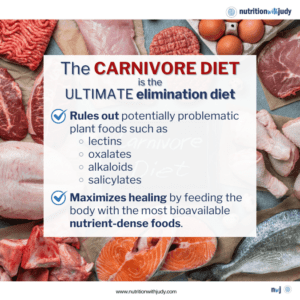

3. Improved Digestive Health: The elimination of fiber-rich, anti-nutrient-containing plant foods can lead to improved digestive health. People with certain digestive issues often find relief from symptoms such as bloating, gas, and irritable bowel syndrome (IBS) when they remove grains, legumes, and vegetables from their diet.
4. Enhanced Mental Clarity: Individuals on the carnivore diet can experience enhanced mental clarity and focus. This could be attributed to the stable blood sugar levels achieved by eliminating carbohydrates, which in turn may reduce brain fog and improve cognitive function.
5. Increased Energy Levels: The carnivore diet also leads to more stable energy levels throughout the day. Without the blood sugar spikes and crashes associated with carbohydrate consumption, individuals often report feeling more energized and less prone to the mid-afternoon slump.
6. Better Blood Sugar Control: For those with diabetes or prediabetes, the carnivore diet can offer a way to better manage blood sugar levels due to its very low to zero carbohydrate content. This can be particularly beneficial in improving insulin sensitivity and reducing the need for medication.
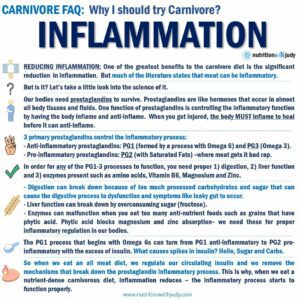

7. Improved Joint and Skin Health: Our clinical practice indicates improvements in joint pain and skin conditions such as acne and eczema for individuals following a carnivore diet.
8. Nutrient Density: Animal products are rich in essential nutrients that are bioavailable, meaning the body can absorb and utilize them more efficiently. These include vitamins B12, D, A, and minerals such as zinc, iron, and selenium. The carnivore diet ensures a high intake of these nutrients, which are crucial for various bodily functions.
9. Potential Reduction in Inflammation: The carnivore diet can help reduce inflammation in the body by eliminating foods that can trigger inflammatory responses. This is particularly relevant for individuals with autoimmune conditions or inflammatory diseases.


10. Support for Mental Health: The carnivore diet has positive effects on mental health, including reductions in anxiety and depression symptoms. This could be related to the diet’s impact on gut health and inflammation, both of which are increasingly linked to mental health.
The carnivore diet presents a unique approach to nutrition that many find beneficial for weight management, digestive health, mental clarity, and more. Its simplicity, combined with incredible health benefits, makes it an appealing option for those looking to reclaim their health.
What Are the Different Carnivore Diet Variations?
The carnivore dietary approach presents multiple adaptations to cater to specific health objectives and personal preferences. Here’s an outline of the diverse iterations of the carnivore diet, each with distinct characteristics:
- Beef-Only Carnivore Diet: This version focuses exclusively on beef consumption, favored for its straightforwardness and efficacy in dietary elimination plans. It is recommended for those addressing autoimmune or chronic conditions, suggesting a start with beef to potentially aid in symptom remission. Diversification with other meat types is advised for long-term nutritional completeness.
- Lion Diet: A more rigorous variant, it limits intake to ruminant meats, alongside salt and water, making it ideal for initial elimination diet phases. This can serve as a foundation for those with autoimmune issues or in need of gut health support, with possibilities for broadening the diet to include other meats later.
- Nose-to-Tail Carnivore Diet: Encouraging the consumption of the entire animal, including organ meats, this variation aims for a rounded nutrient profile. However, individuals with specific health conditions should monitor organ meat consumption to avoid potential nutrient excesses, such as vitamin A overload.
- Meat-Only Carnivore Diet: This form extends to all animal muscle meats while excluding organ meats, dairy, and eggs, serving as a base elimination diet for those confirmed to tolerate muscle meats well.
- Zero-Carb Carnivore Diet: Targeting zero or minimal carbohydrate intake, this diet encompasses dairy, eggs, and all meats, focusing on meat and animal fats. It may include seasonings and suits those without autoimmune or significant chronic health conditions who can handle dairy and/or eggs.
- Carnivore Keto Diet: Merging ketogenic diet principles with carnivore dietary practices, this low-carb, high-fat strategy seeks to simulate fasting benefits, incorporating low-toxicity plant-based keto foods such as avocados and coconut oil. It’s suited for those in good metabolic health without significant chronic conditions.
- Carnivore-ish Keto Diet: Offering greater leniency, this variation integrates additional ketogenic elements while prioritizing animal-based foods. It allows for the inclusion of keto-friendly sweeteners and some nuts, recommended for metabolically healthy individuals without food addiction concerns.
- Animal-Based Diet: This broad approach centers on animal products while permitting fruits, honey, and raw dairy, usually observed to only benefit highly metabolically flexible individuals and elite athletes. We don’t recommend this variation generally.
Each of these carnivore diet variants provides a framework for individuals to tailor their eating habits according to their health needs, dietary tolerances, and wellness goals, ensuring a personalized approach to nutrition.
Ruminant Meats vs. Red Meat
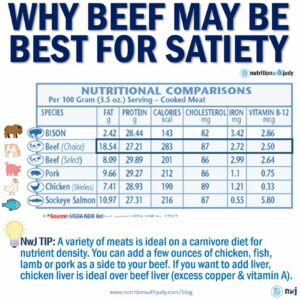

Variations of the carnivore diet are intricately defined not by the broad category of red meat, which encompasses both ruminant and monogastric sources, but rather by the specific inclusion of meats based on the digestive systems of the animals they come from.
Ruminant meats, derived from animals with a complex stomach structure designed for fermenting plant-based food before digestion, such as cattle, sheep, and goats, are a cornerstone in certain strict carnivore diet variations. These diets emphasize ruminant meats for their high nutrient density and favorable fatty acid profiles, believed to offer greater health benefits compared to meats from monogastric animals (those with a single-chambered stomach), such as pigs and chickens.
This distinction is crucial because both ruminant and monogastric animals can provide “red meat,” yet their nutritional compositions differ significantly. Red meat is not the defining factor of these diet variations; instead, the focus is on the source of the meat and its nutritional content.
For instance, the Lion Diet, a stricter form of the carnivore diet, focuses exclusively on ruminant meats, highlighting the diet’s emphasis on food quality and potential health impacts rather than merely the color or type of meat consumed. This nuanced approach allows individuals to tailor their carnivore diet based on specific health goals, dietary needs, and responses to different types of animal foods.
The Red Meat List
Red meat, characterized by its higher myoglobin content compared to white meat, is a principal source of nutrition in many diets around the world. This category of meat includes a variety of animal sources, broadly categorized into two groups based on the animals’ digestive systems: ruminants and monogastric animals.
Ruminant Red Meats
- Beef: A staple in many diets, known for its rich flavor and nutrient profile, including iron, zinc, and B vitamins.
- Bison: Another popular ruminant red meat option, bison is generally leaner compared to beef.
- Lamb: Offers a unique taste, often associated with a rich source of iron, zinc, and vitamin B12.
- Venison: Lean and flavorful, venison is known for its high protein and low-fat content.
- Goat: Less common in Western diets but widely consumed worldwide, goat meat is lean and high in protein.
Monogastric Red Meats
- Pork: Although sometimes classified as white meat, pork is scientifically considered red meat due to its higher myoglobin content than poultry.
- Horse: In some cultures, horse meat is consumed and is classified as red meat due to its nutrient composition and darker color.
Each type of red meat offers distinct flavors and nutritional benefits. Ruminant meats are often highlighted for their omega-3 fatty acids and conjugated linoleic acid content, which have various health benefits. Monogastric meats, while nutritious, have different fat compositions and have higher polyunsaturated fat (PUFA) content. If you’re concerned about PUFAs from pork or poultry, we’ve debunked that here.
Understanding these differences can help individuals make informed choices about including red meat in their diets, tailored to their health goals and dietary preferences.
Which Red Meats Should I Include In My Carnivore Diet?
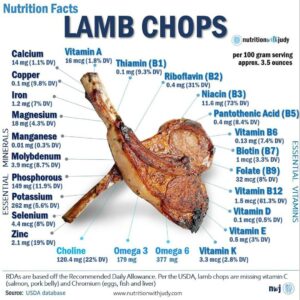

In tailoring a carnivore diet, the selection of red meats plays a critical role in aligning with nutritional goals and personal health objectives. Ruminant red meats are universally included across all variations of the carnivore diet. This broad acceptance is due to their nutrient density, including high levels of essential fatty acids, vitamins, and minerals beneficial to health. They’re also generally easier to digest and ideal for ultra-sensitive individuals.
The exception within these variations is the beef-only carnivore diet, which, as the name suggests, exclusively focuses on beef as the primary source of nutrition. This approach is often adopted for its simplicity and potential benefits in addressing autoimmune and chronic health conditions through an elimination diet framework.
On the other hand, pork, a monogastric red meat derived from animals with a single-chambered stomach, finds its place in the carnivore diet primarily within specific variations.
These include the nose-to-tail carnivore diet, which advocates for consuming all parts of the animal; the meat-only carnivore diet, focusing on muscle meats while excluding dairy and eggs; the zero-carb carnivore diet, emphasizing foods with minimal to no carbohydrate content; and both the carnivore keto diet and the carnivore-ish keto diet, which blend carnivorous principles with ketogenic low-carb, high-fat approaches.
All of these diet variations include pork alongside other meats, offering a broader spectrum of nutritional benefits and taste profiles to cater to diverse dietary preferences and health requirements.
Introducing Pork Into Your Carnivore Diet
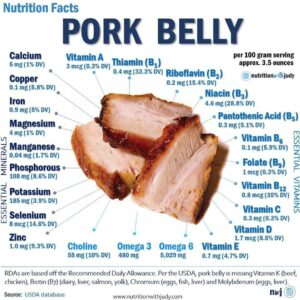

Introducing pork into your carnivore diet should be approached with consideration for quality and source, as these factors are important for the transition period. Beginning with high-quality, pasture-raised pork that is free from corn, soy, and gluten feed is paramount. This type of pork is derived from pigs that have been raised in more natural conditions, allowing them access to roam and forage, which contributes to a healthier fat profile, including higher levels of omega-3 fatty acids and vitamins compared to conventionally raised pork.
Opting for pasture-raised pork is particularly important for individuals with food sensitivities and intolerances. If you’re re-introducing foods and aren’t as sensitive or in active healing, you can always try introducing conventional pork first. We always believe in choosing the meat you like and can afford as long as you tolerate it.
However, we generally recommend the following. Once you have comfortably incorporated high-quality pasture-raised pork into your diet and assessed your body’s response to it, you may then consider experimenting with conventionally raised pork options.
The Benefits of Red Meat for Your Health
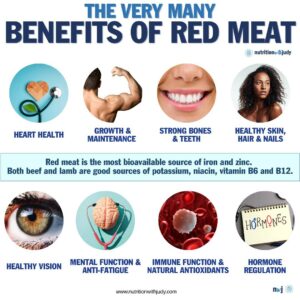

Red meat is a nutritional superfood, offering a wealth of health benefits that stem from its rich nutrient profile. Exclusive to red meat, particularly pork, are several nutrients that play critical roles in our health and well-being. These include high-quality protein for muscle repair and growth, iron in a form that is more easily absorbed by the body (heme iron), crucial for oxygen transport and energy production, and zinc, essential for immune function and wound healing.
Pork also provides a unique source of vitamin B1 (thiamine), which is vital for carbohydrate metabolism and energy production, and vitamin B12, found only in animal products, supporting nerve function and the formation of red blood cells.
Additionally, red meats are significant sources of selenium, an antioxidant that helps to combat oxidative stress and supports thyroid health, and creatine, which is beneficial for muscle function and performance. The presence of conjugated linoleic acid (CLA) in red meat, especially in grass-fed varieties, has been linked to reduced body fat and improved immune function.
By including red meat in a balanced diet, individuals can tap into these exclusive nutrients, leveraging their potential to enhance health, from improved metabolic function and energy levels to stronger immunity and muscle health.
Closing Thoughts On the Carnivore Diet and Red Meat List
Throughout our discussion on the carnivore diet and the optimal red meat list for those embarking on this dietary journey, we’ve highlighted the diet’s inherent simplicity and its myriad of health benefits. We’ve navigated through the diverse variations of the carnivore diet, each tailored to meet different nutritional needs and health goals, emphasizing the importance of incorporating high-quality, nutrient-dense red meats. Key to this dietary approach is the inclusion of ruminant meats, such as beef, lamb, and goat, across nearly all variations of the diet, due to their rich content of essential nutrients that are pivotal for health.
Additionally, we’ve addressed the strategic incorporation of pork, a monogastric source of red meat, within specific carnivore diet variations, advocating for high-quality, pasture-raised options when first re-introducing. The exploration into the unique nutrients found exclusively in red meat, particularly pork, underscores the value of these foods in supporting muscle growth, energy production, immune function, and overall health.
Work With Our Trusted Carnivore Diet Functional Nutritional Therapy Practitioners
The Nutrition with Judy practice is honored to be a trusted carnivore diet practitioner support serving clients from around the globe. We’re passionate about helping our clients achieve root-cause healing in order to lead the best quality of life possible that’s nearly symptom-free. Our team is dedicated to helping individuals find the right carnivore diet variation for their specific health goals. We welcome you to explore our free resources and are always available to support you through personalized protocols. Our Symptom Burden Assessment (SBA) is the perfect starting point for discovering your root cause and is required to work with our team— you can learn more in-depth about this powerful tool here.
Start your root-cause healing journey today and contact us any time with any questions or concerns.
DISCLAIMER: This content is for educational purposes only. While we are board-certified in holistic nutrition and are nutritional therapy practitioners, we are not providing medical advice. Whenever you start a new diet or protocol, always consult with your trusted practitioner first.




